Spain recognises the work of the great British historian, Paul Preston
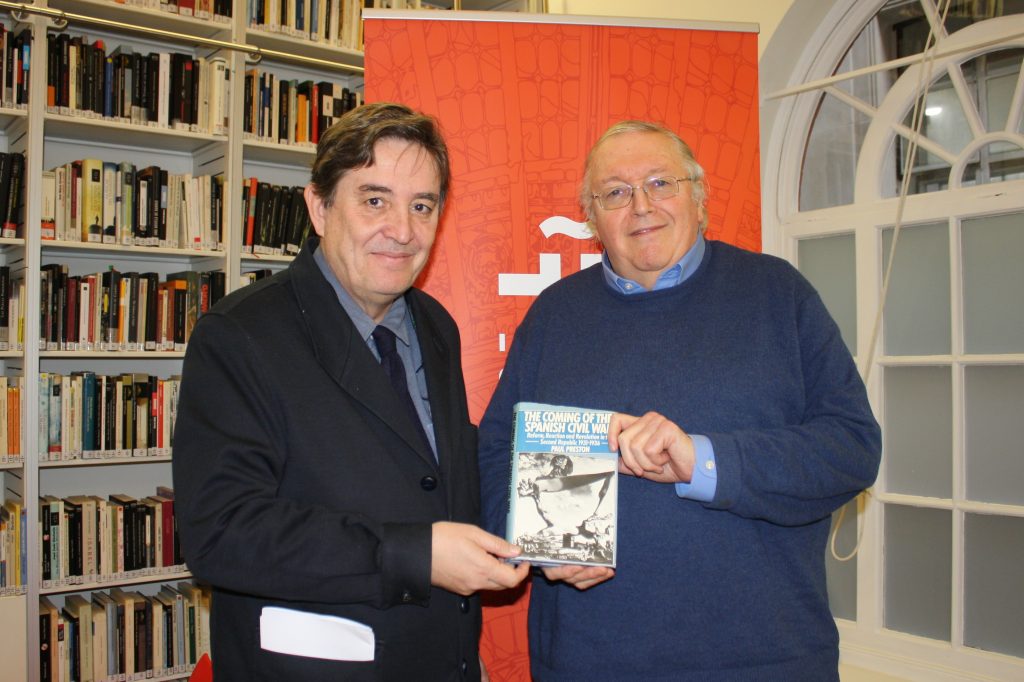
The British historian and Hispanist Sir Paul Preston (Liverpool, 1946) will make an announcement in London on February 28th, that he has chosen to leave a copy of the first book he published in the Caja de las Letras, Instituto Cervantes’ headquarters in Madrid.
The Caja de las Letras is a vault of safe-deposit boxes in a former bank building that has been repurposed as a time capsule for Hispanic culture. Many Spanish artists and thinkers have been invited to leave an artifact of their choosing in the security boxes, along with the date the safe should be reopened.
In the case of Sir Paul Preston, he has chosen a book based on his thesis, The Destruction of Democracy in Spain (1978) which contains notes written by Hispanist Sir Raymond Carr. The first box ever used was Number 1,000 and was filled by writer Francisco Ayala in 2007. And for the first time in the history of the boxes, Preston’s donation is going to be done away from Madrid.
As Sir Paul Preston suffers from specific health problems that prevent him from travelling to Spain, his donated book will be taken to Madrid in a red briefcase guarded by the director of Instituto Cervantes, Luis García Montero.
«It is a great honor to join the Caja de las Letras, especially when it seems that there are very few writers who are not Spanish-speaking, and that has moved me,» said the British historian, who chose to open his box in five years time.
The text, a documented study that traces the origins of the Spanish Civil War, was started from the doctoral thesis that he presented at the University of Oxford about the monarchical conspiracies against the Spanish Republic. It is a copy much valued by Sir Paul Preston because of the annotations from his teacher, British historian and Hispanist Sir Raymond Carr (1919-2015).
“If you leave an object without further ado, for me it does not have much interest for those who open the Caja de las Letras in the future. That is why I thought that if someone interested in my work opens it, this has twice the interest, since it is my book and is annotated by Raymond Carr. In addition, this copy arrived to me in a very strange way: a friend found it in a second-hand bookshop and then he gave it to me,” explained Sir Paul Preston.
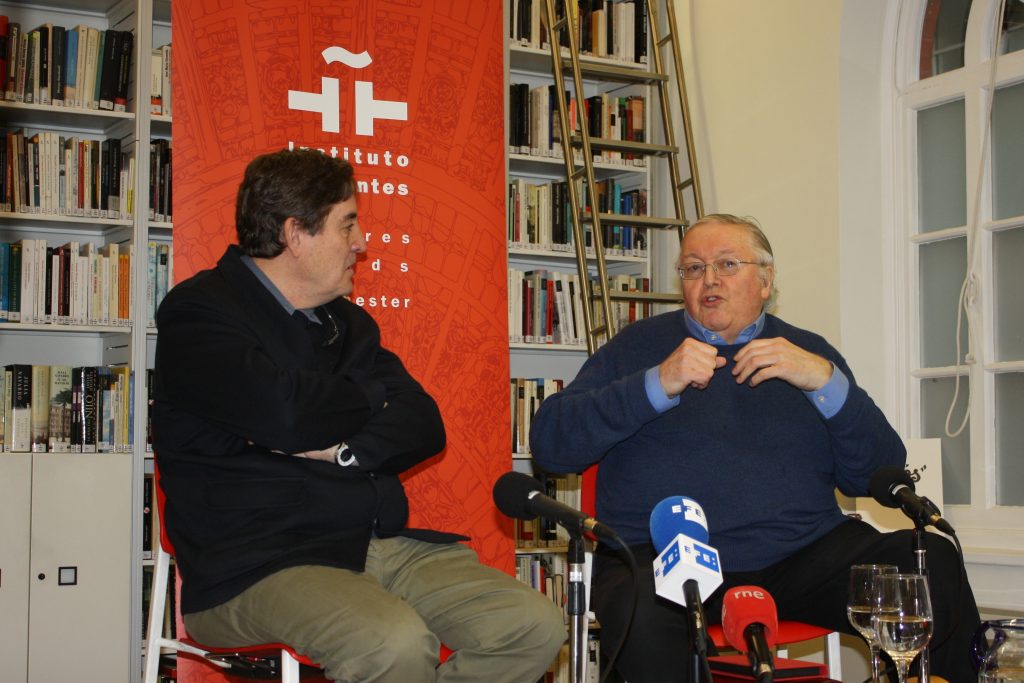
Disciple of Hugh Thomas
Sir Paul Preston’s childhood was spent in a working-class neighborhood of Liverpool, a city heavily punished by German bombing during World War II, as it was the port that received food and weapons shipments from the United States.
«I was born just after the War, but in my childhood the conversations of adults were very much about the bombings and the blitz, which came from the German expression blitzkrieg, quick war.» Very soon those stories became my favorite readings when I reached adolescence and I began to be interested in reading, above all, about the origins of World War II,” said the British historian.
Sir Paul Preston considered that he had «really incredible luck» for a working-class boy and from the North in being able to study History at Oxford University. «It was a small miracle and I was hoping, but among the subjects there were few which really impassioned me: almost everything was Constitutional History,» he added.
At the end of the race, and «wanting more», Sir Paul Preston again had «immense luck» when he was offered a scholarship to a postgraduate course on the period of Entreguerras (1918- 1939) at the University of Reading. “One of the subjects, the one that dealt with the Spanish Civil War, was given by Hugh Thomas. There I started teaching with him and everything fascinated me.”
From that moment, Sir Paul Preston began to «eat books» and read everything in English about the Spanish Civil War, realising that it was the perfect topic for his doctoral research: «It was a pandora box in which there was everything, fascism, communism, socialism, Freemasonry and great international figures (Stalin, Hitler, Trotsky…), etc.”
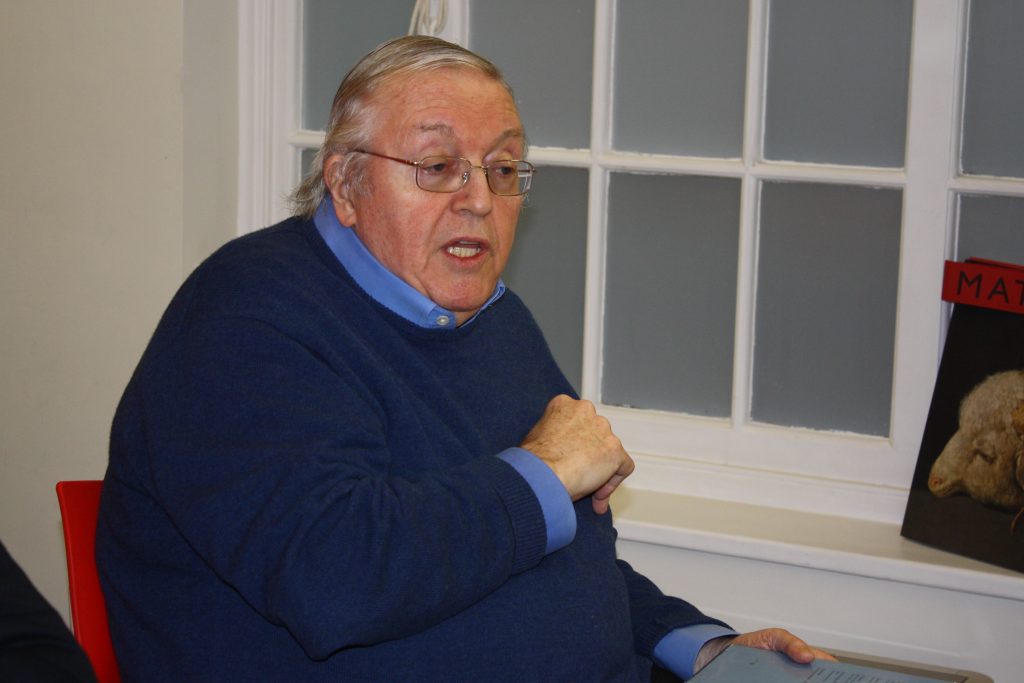
First trip to Spain
It was at that time that Sir Paul Preston decided that he «had to learn Spanish» and began to practice it with Colombian students in the cafeteria of the University. He traveled to Spain for the first time in the late 60s: “It was a great crush because Spain at that time had little to do with Spain today. I remember walking the streets of Madrid, the smells of food and the work of artisans.”
Sir Paul Preston acknowledged that he felt in love with Spain and was very excited with “the welcome that people gave me, I don’t know if it is like that now, but for someone who only babbled a couple of words in Spanish, people were very warm and they loved to see you and try to improve your Spanish, quite the opposite than in other countries.”
A life dedicated to the study of the History of Spain
Sir Paul Preston is a Doctor in History at the University of Oxford. He is a member of the British Academy and director of the Canada Blanch Centre of the London School of Economics, where he was Professor of International History for many years. Preston enjoys global fame as one of the greatest experts in the Spanish Civil War. He is also the author of reference biographies for Franco and Juan Carlos I.
Specialist in contemporary Spain, the historian has received the Commendation of the Order of Civil Merit and the Grand Cross of the Order of Isabel la Católica. Among his most outstanding works are Revolution and War in Spain 1931-1939 (1986); The Spanish Civil War (1987); Franco, leader of Spain (1994); Juan Carlos I (2003); The Spanish Holocaust (2011); the biography of Santiago Carrillo The red fox (2013), and his most recent and monumental work, A betrayed people: Spain from 1876 to the present day: Corruption, political incompetence and social division (2019).
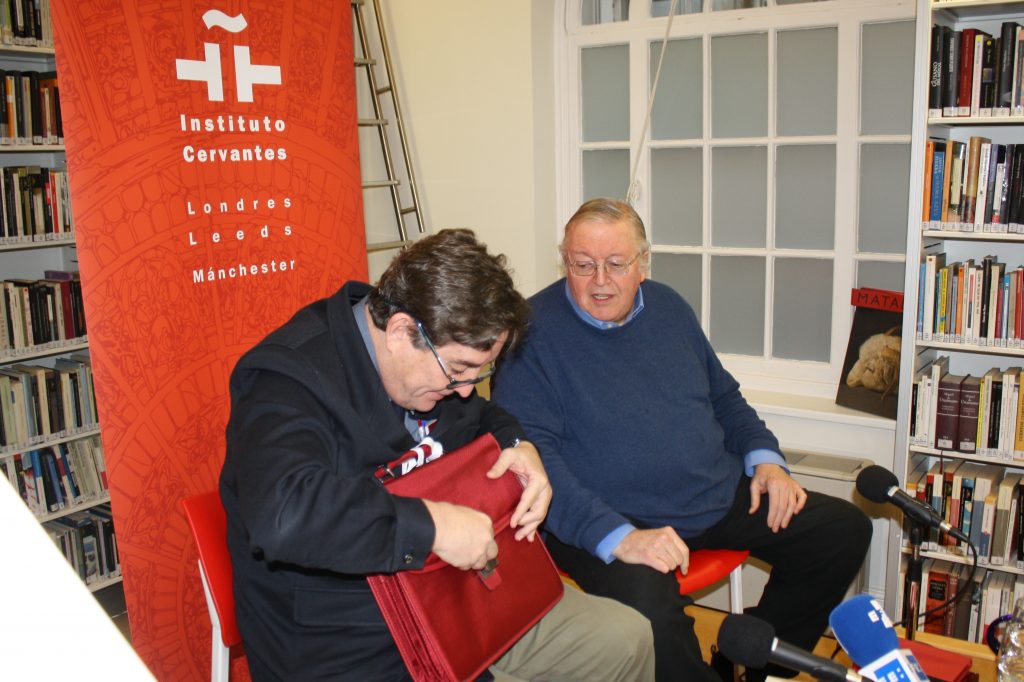
First artifact in La Caja de las Letras made from a distance
The artifact left by Sir Paul Preston is the first one that is made from a distance in the history of Instituto Cervantes. The book donated by the great British historian will travel in a red briefcase guarded by the director of the Spanish institution, Luis García Montero.
With the delivery of his legacy, Sir Paul Preston joins another Hispanist historian Sir John Elliott, the first native non-Spanish speaker invited by Instituto Cervantes to the former vault of its headquarters in October 2017. This month, Irish Hispanist Ian Gibson joined him, choosing to leave as a legacy two books by Gerald Brenan.
The Caja de las Letras celebrated its first decade in 2018 as a time capsule that keeps legacies ceded by cultural personalities in Spanish. Writers, artists, musicians, scientists, filmmakers or actors have left locked-up personal objects that are witnesses and memories of their life trajectory in the former vault of the Instituto Cervantes’ headquarters.
Throughout these years, prominent protagonists of the culture of Spain and Latin America have deposited their legacies in one of the 1,800 safety boxes located in the building known as the Cariátide, in the centre of Madrid. Through their basements, all the writers awarded the Cervantes Prize in the last two decades have passed: Antonio Gamoneda, Juan Gelman, Ana María Matute, Juan Marsé, José Emilio Pacheco, José Manuel Caballero Bonald, Nicanor Parra, Elena Poniatowska, Juan Goytisolo, Fernando del Paso and Eduardo Mendoza.
Narrator and essayist Francisco Ayala, Cervantes Prize 1991, was the one who inaugurated the Caja de las Letras in February 2007 with a secret legacy in box number 2,000. Since then, other illustrious authors in addition to those mentioned, such as Carlos Edmundo de Ory, Pablo García Baena or Jorge Edwards, have left their mark in this peculiar enclave where customers formerly deposited jewels and treasure.
Although writers make up the majority of the boxes (almost twenty), many other expressions of culture are also represented: art (Antoni Tàpies), science (Margarita Salas), music (Cristóbal Halffter, Luis de Pablo), dance (Alicia Alonso, Víctor Ullate), cinema (Luis García Berlanga), theatre (Nuria Espert), interpretation (Manuel Alexandre), photography and edition (Mario Muchnik) or literary management (Carmen Balcells).
The boxes each have a specific opening date, chosen by each guest. There is only one exception: composer Luis de Pablo asked that his safe be opened when he dies (therefore, it is not known when) and that in the same act the unpublished score that he left saved there must be read. So far, three boxes have been reopened: those of the literary agent Carmen Balcells, actor Manuel Alexandre and molecular biologist Margarita Salas.
Among other objects, it is worth mentioning the typewriter of the recently deceased Nicanor Parra, who ceded his grandson in 2012, since the Chilean poet, who was then 97 years old, could not come to Spain to collect the Cervantes prize.
Legacies in memoriam
The Caja de las Letras also keeps four legacies in memoriam, that is, personalities already deceased. Colombian Nobel laureate Gabriel García Márquez retains a box with land from his home in Aracataca. Antonio Buero Vallejo, his pipe and one of the pens with which he wrote the plays. From writer Miguel Hernández, a first edition of his earliest poems, Perito en lunas (1933). And from Argentine singer Atahualpa Yupanqui, handwritten postcards sent to his wife during his trips.
Sir Paul Preston, protagonista del primer “legado a distancia” de la historia del Instituto Cervantes

El hispanista e historiador británico Sir Paul Preston (Liverpool, 1946) anunció hoy en Londres que depositará en la Caja de las Letras del Instituto Cervantes en Madrid, a modo de legado, un ejemplar del primer libro que publicó, basado en su tesis, La destrucción de la democracia en España (1978), anotado por el también hispanista Sir Raymond Carr.
El legado de Sir Paul Preston es el primero que se hace a distancia en la historia del Instituto Cervantes. El historiador británico padece problemas puntuales de salud que le impiden desplazarse a España, por lo que el libro donado viajará en un maletín rojo custodiado por el director de la institución española, Luis García Montero.
“Es un gran honor unirme a la Caja de las Letras, máxime cuando parece que hay poquísimos escritores que no son de lengua española, y eso me ha conmovido”, destacó el historiador británico, quien eligió que se abra su caja en cinco años, pensando en que sea una fecha cercana.
El texto, un documentado estudio que rastrea los orígenes de la Guerra Civil española, nació de la tesis doctoral que presentó en la Universidad de Oxford sobre las conspiraciones monárquicas en contra de la República española, y es un ejemplar muy apreciado por el hispanista, ya que tiene anotaciones de su maestro de Sir Paul Preston, el también historiador e hispanista británico Sir Raymond Carr (1919- 2015).
“Si dejas un objeto sin más, para mí no tiene mucho interés para quienes abran la Caja de las Letras en el futuro. Por eso pensé que si la abre alguien interesado en mi trabajo, esto tiene el doble de interés, ya que es mi libro y está anotado por Raymond Carr. Además, a mí me llegó este ejemplar de una forma muy estrafalaria: una amiga lo encontró en una librería de segunda mano y luego me lo regaló”, explicó Sir Paul Preston.

Discípulo de Hugh Thomas
La infancia de Sir Paul Preston transcurrió en un barrio obrero de Liverpool, una ciudad muy castigada por los bombardeos alemanes durante la Segunda Guerra Mundial, ya que era el puerto que recibía los envíos de comida y armamento desde Estados Unidos.
“Yo nací justo después de la Guerra, pero en mi infancia las conversaciones de los adultos versaban mucho sobre los bombardeos y el blitz, que venía de la expresión alemana blitzkrieg, ‘guerra rápida’. Muy pronto esas historias se convirtieron en mis lecturas favoritas cuando llegué a la adolescencia y comenzó a interesarme leer, ante todo, sobre los orígenes de la Segunda Guerra Mundial”, comentó el historiador británico.
Sir Paul Preston consideró que tuvo “una suerte realmente increíble” para un chico de clase de obrera y del norte, de Liverpool, al poder ir a la Universidad de Oxford a estudiar Historia. “Fue un pequeño milagro e iba con muchas esperanzas, pero entre las asignaturas había pocas que me apasionaran de verdad: casi todo era Historia constitucional”, añadió. Al terminar la carrera, y “con ganas de más”, el profesor Preston volvió a tener “una inmensa suerte”, ya que le ofrecieron una beca para ir a estudiar a la Universidad de Reading un posgrado sobre el período de Entreguerras (1918-1939). “Una de las asignaturas, la que versaba sobre Guerra Civil Española, la daba Hugh Thomas. Ahí empecé a dar clase con él y me fascinó todo”.
Desde ese momento, Sir Paul Preston empezó a “zampar libros” y leer todo lo que había en inglés sobre la Guerra Civil española, dándose cuenta de que era el tema perfecto para su investigación doctoral: “Era una caja de pandora en la que había de todo, fascismo, comunismo, socialismo, masonería y grandes figuras internacionales (Stalin, Hitler, Trotsky…), etc ”.
Primer viaje a España
Fue en ese momento en el que Sir Paul Preston decidió que “había que aprender español” y empezó a practicarlo con estudiantes colombianos en la cafetería de la Universidad. A España viajó por primera vez a finales de los 60: “Fue un gran flechazo porque la España de entonces poco tenía que ver con la España de hoy. Me acuerdo de andar por las calles de Madrid, de los olores de la comida y los trabajos de los artesanos”.
Sir Paul Preston reconoce que se enamoró de España y se emocionó mucho con “la bienvenida que me daba la gente, yo no sé si es así ahora, pero para alguien que solo balbuceaba un par de palabras en español, la gente tenía un tremendo calor y les encantaba verte e intentar mejorar tu español, todo lo contrario que en otros países”.

Una vida dedicada al estudio de la Historia de España
Sir Paul Preston es doctor en Historia por la Universidad de Oxford. Es miembro de la British Academy y director del Cañada Blanch Centre de la London School of Economics, en la que fue profesor de Historia internacional durante muchos años. Preston goza de fama global como uno de los mayores expertos en la Guerra Civil española. Es también autor de biografías de referencia de Franco y de Juan Carlos I.
Especialista en la España contemporánea, el historiador ha recibido la Encomienda de la Orden del Mérito Civil y la Gran Cruz de la Orden de Isabel la Católica. Entre sus obras más destacadas están Revolución y guerra en España 1931-1939 (1986); La Guerra Civil española (1987); Franco, caudillo de España (1994); Juan Carlos I (2003); El holocausto español (2011); la biografía de Santiago Carrillo El zorro rojo (2013), y su más reciente y monumental, Un pueblo traicionado: España de 1876 a nuestros días: Corrupción, incompetencia política y división social (2019).

Primer legado a distancia
El legado de Sir Paul Preston es el primero que se hace a distancia en la historia del Instituto Cervantes. El libro donado por el gran historiador inglés viajará en un maletín rojo custodiado por el director de la institución española, Luis García Montero.
Con la entrega de su legado, Sir Paul Preston se une a otro hispanista británico, Sir John Elliott, el primer hablante nativo no español invitado por el Instituto Cervantes a la Caja de las Letras de su sede en octubre de 2017. Este mes, se sumó el hispanista irlandés Ian Gibson, quien dejó como legado dos libros de Gerald Brenan.
La Caja de las Letras cumplió su su primera década en 2018 como cápsula del tiempo que guarda legados cedidos por personalidades de la cultura en español. Escritores, artistas, músicos, científicos, cineastas o actores han dejado custodiados bajo llave, en la antigua cámara acorazada de la sede del Instituto Cervantes, objetos personales que son testigo y recuerdo de su trayectoria vital.
A lo largo de estos años, destacados protagonistas de la cultura de España e Hispanoamérica han depositado sus legados en alguna de las 1.800 cajas de seguridad ubicadas en el conocido como edificio de las Cariátides, en el centro de Madrid. Por sus sótanos han pasado todos los escritores galardonados con el Premio Cervantes en los dos últimos lustros: Antonio Gamoneda, Juan Gelman, Ana María Matute, Juan Marsé, José Emilio Pacheco, José Manuel Caballero Bonald, Nicanor Parra, Elena Poniatowska, Juan Goytisolo, Fernando del Paso y Eduardo Mendoza.
El narrador y ensayista Francisco Ayala, premio Cervantes 1991, fue quien inauguró la Caja de las Letras en febrero de 2007 con un legado secreto en la caja número mil. Desde entonces, otros ilustres autores además de los mencionados, como Carlos Edmundo de Ory, Pablo García Baena o Jorge Edwards, han dejado su huella en este peculiar enclave donde los clientes de las sucesivas entidades bancarias que aquí se ubicaron décadas atrás atesoraban dinero, joyas u otros valiosos bienes.
Aunque los escritores son mayoría (casi una veintena), otras muchas expresiones de la cultura están asimismo representadas: el arte (Antoni Tàpies), la ciencia (Margarita Salas), la música (Cristóbal Halffter, Luis de Pablo), la danza (Alicia Alonso, Víctor Ullate), el cine (Luis García Berlanga), el teatro (Nuria Espert), la interpretación (Manuel Alexandre), la fotografía y la edición (Mario Muchnik) o la gestión literaria (Carmen Balcells).
Las cajas tienen fecha concreta de apertura, elegida por cada invitado. Solo hay una excepción: el compositor Luis de Pablo pidió que su caja de seguridad se abra cuando él muera (por tanto, no se sabe cuándo) y que en el mismo acto se interprete la partitura inédita que dejó guardada. Hasta el momento se han reabierto tres cajas: las de la agente literaria Carmen Balcells, el actor Manuel Alexandre y la bióloga molecular Margarita Salas.
Entre otros objetos, cabe citar la máquina de escribir del recientemente fallecido Nicanor Parra, que cedió en 2012 su nieto, ya que el poeta chileno, que contaba entonces con 97 años, no pudo venir a España a recoger el premio Cervantes.
Legados in memoriam
La Caja de las Letras también guarda cuatro legados in memoriam, es decir, de personalidades ya fallecidas con anterioridad. Del Nobel colombiano Gabriel García Márquez conserva una arqueta con tierra de su casa natal en Aracataca. De Antonio Buero Vallejo, su pipa y uno de los bolígrafos con los que escribía las obras dramáticas. De Miguel Hernández, una primera edición de su poemario más temprano, Perito en lunas (1933). Y del cantor argentino Atahualpa Yupanqui (el legado más reciente, del pasado 19 de enero), tarjetas postales escritas a mano y enviadas durante sus viajes a su esposa.
Spanish-British culture figures analyze the bilateral cultural relationship after Brexit
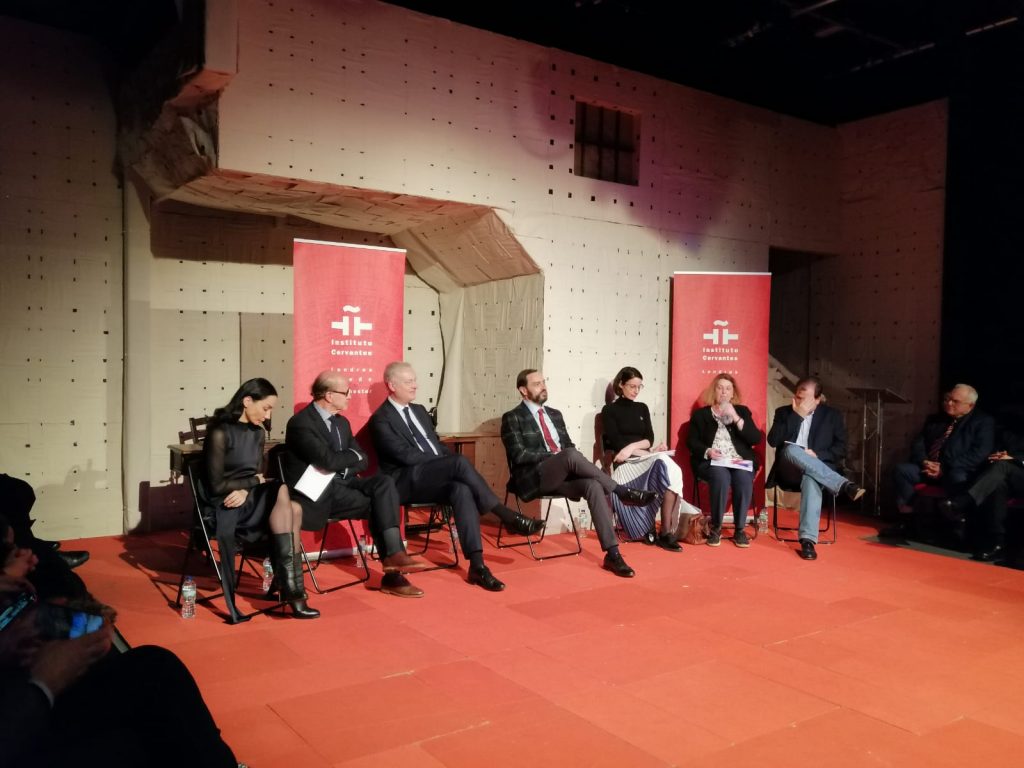
Outstanding figures of British Hispanic culture have participated in the round table Future: English & Hispanic Culture After Brexit, in which they highlighted the necessity of unifying both countries to face the challenges and seize the opportunities after Brexit. One of the main issues discussed focused on the relevance of Spanish as a relevant language for everyday life and its incredible growth in British schools. The event took place at the Cervantes Theatre under the auspices of the Instituto Cervantes in London and with support from the Spanish Embassy.
The round table was introduced by the Ambassador of Spain to the United Kingdom, Carlos Bastarreche as well as the Ambassador of Honduras to the United Kingdom. Subsequently, the director of Instituto Cervantes, Luis García Montero, paid a tribute to British Hispanism, praising the work of great historians and academics such as Sir John Elliott, Sir Paul Preston and the recently deceased, Trevor Dadson.
The round table was moderated by the correspondent of El País in the United Kingdom, Rafa de Miguel, and had the following speakers: the director of the English National Ballet (ENB), Tamara Rojo; the Ambassador of Ecuador to the United Kingdom and novelist, Jaime Marchán; former United Kingdom ambassador to Spain, Simon Manley; the director of the Institute for Modern Languages Research (IMLR), Catherine Davies; the president of the Society of Spanish Scientists in the United Kingdom (CERU), Rocio Gaudioso; and the researcher of the Elcano Royal Institute, Ignacio Molina.
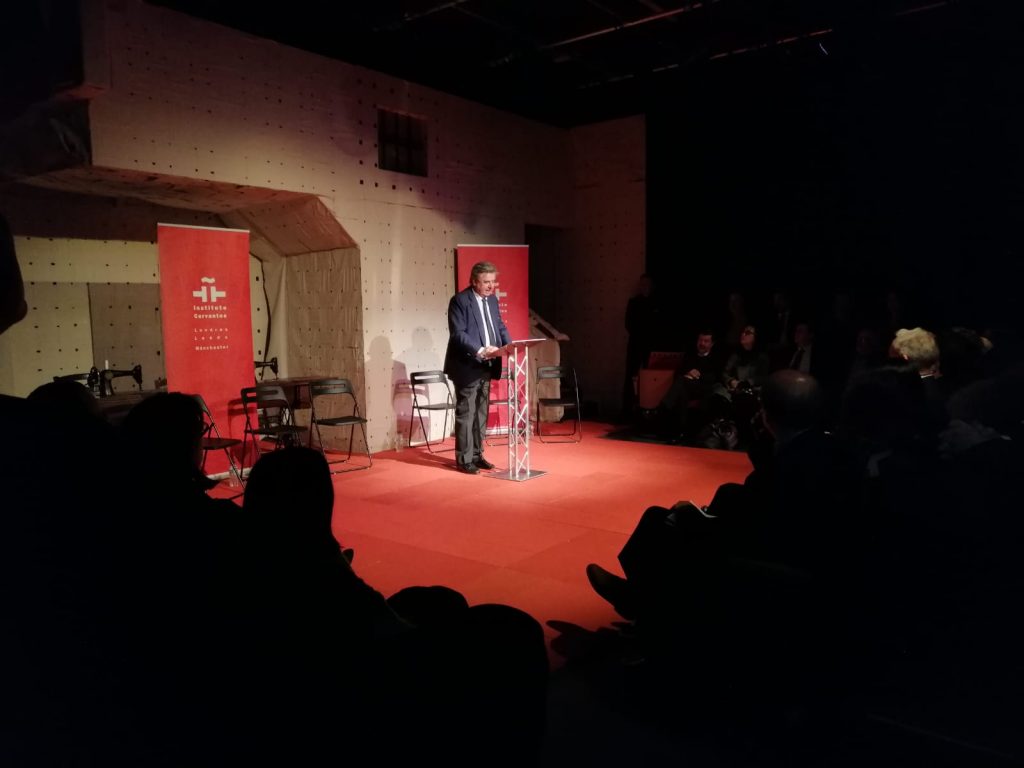
The value of language as a human right
The Ambassador of Ecuador to the United Kingdom and novelist, Jaime Marchán, pointed out that Brexit is “the democratic realisation of the decision of a member country to leave the EU”. However, he said that, like any change, it can also be «seen as an opportunity» and believes that, from now on, we will see a European country with greater autonomy to play an important global role in all areas, including cultural aspects.
For Marchán, Brexit «invites us to reflect on the universal power of the English language beyond all borders» and cited a memorable phrase by George Steiner, a fundamental figure of critical thinking of the twentieth century, which in his opinion summarises the perfection the multicultural sense of language and literature: «Give me a work table and I already have a homeland.»
In fact, his commitment as Ambassador is “for a better reciprocal knowledge of both languages: Spanish and English”, highlighting how the Cervantes Institute and the British Council are an important cultural base to increase better and greater knowledge, not only of the languages, but of the Latin American and English cultures. But language is not just words, and as such, he insisted on the importance of «the value of language as a human right.»
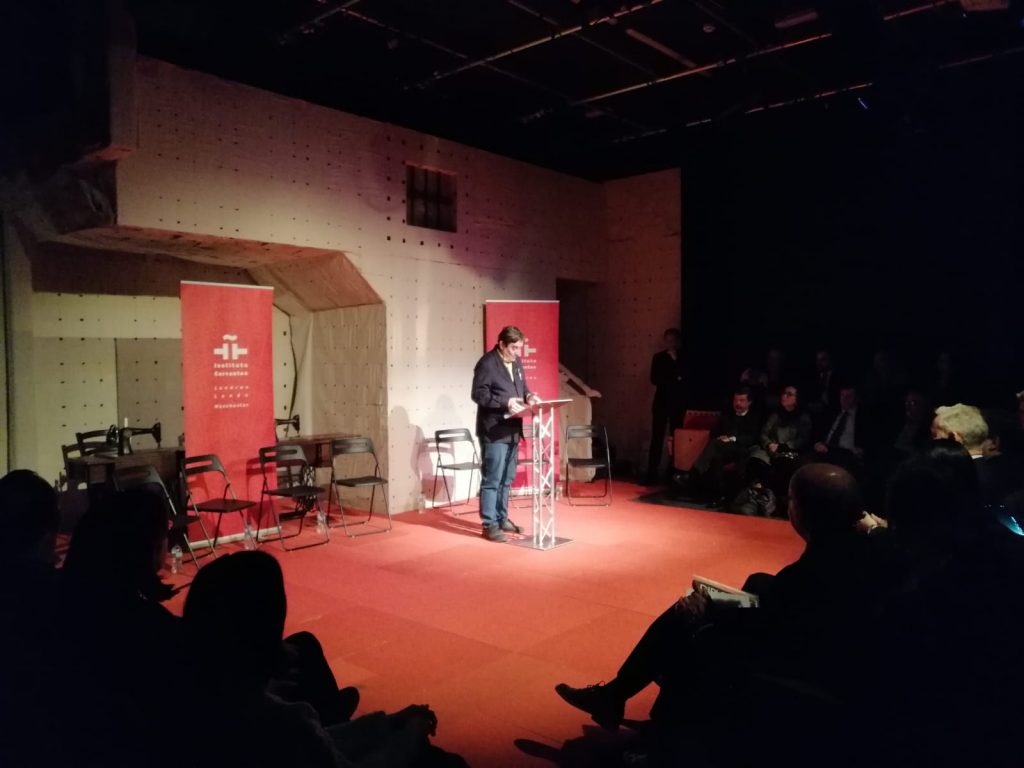
«The incredible growth» of Spanish in British schools
The former United Kingdom ambassador to Spain, Simon Manley, hopes that the future of the cultural relationship between the United Kingdom and the Hispanic world after Brexit will be “very rich”, extolling the links and opportunities, especially “thanks to the efforts of so many Spaniards so talented in our country. ”
For Manley, the current challenge is «uncertainty and false news” but he appreciates that future opportunities»are more important». Our two countries are proud of their great traditions, but with international views and innovative visions. In addition, he highlighted “the incredible growth” of Castilian in British schools, and how, the Hispanic culture advances in several dimensions, with Netflix series such as La casa de papel a la flamenco, cine, or gastronomia.
Spanish, a language relevant to everyday life
The director of the Institute for Modern Languages Research (IMLR), Catherine Davies, noted that in the last ten years, the number of students enrolling in modern languages has decreased, especially in German and French, but not in the case of Spanish and Portuguese, which have grown in importance, status and impact in the higher education sector.
In the case of Spanish studies in schools, Davies believes that interest in Spanish has grown tremendously in the last 20 years: “Spanish is considered relevant for everyday life, mainly because most Britons and their children have visited Spain and have spent their holidays there. Many British expatriates live in Spain, especially grandparents. Spanish is an easy language to acquire at a basic level, so communication can be established quickly. Young people are motivated, feel they are making progress and can test their language skills on vacation. ”
Davies points out that Brexit will make «it will be more difficult to recruit university professors and professors from Spain» and did not hide her concern about how «the constant traffic of goods and people between the two countries can be seriously compromised». However, Davies also pointed out that British interest in Spain started prior to the entry of the United Kingdom into the EU.
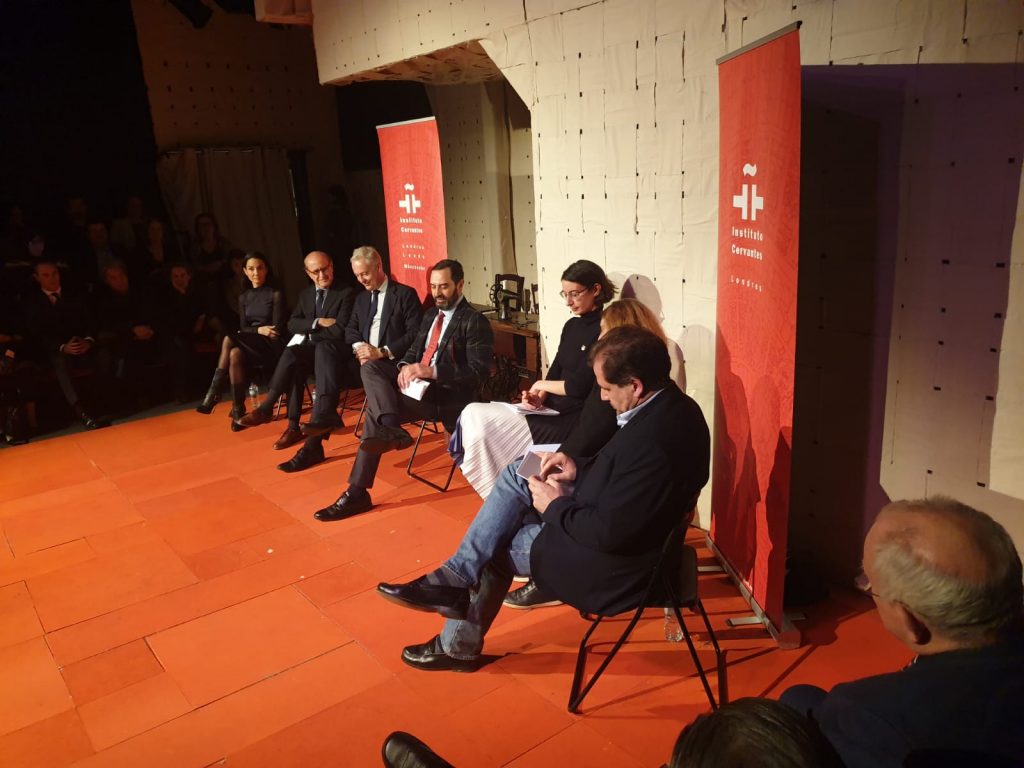
United Kingdom and the European Union are needed
The president of the Society of Spanish Scientists in the United Kingdom (CERU), Rocio Gaudioso, stressed that the scientific community is in a situation with respect to Brexit which is, «at the same time, an opportunity and a challenge: research cannot be done in isolation, the United Kingdom and the European Union need each other to maintain their competitiveness and to face the social and technological challenges that come ”.
Gaudioso also pointed out that Spanish-British relations in research are “mature and well founded in respect and admiration between both countries’. This situation can help reduce the negative effects of Brexit, but he stressed that “the damage is already becoming visible and it can only be prevented with the strength of diplomacy and scientific collaboration. Our governments must remember our common objectives so that we can face the upcoming challenges”.
Gaudioso is clear that “research has always been, and always will be, a global mission. The challenges we face cannot be solved by countries in isolation and this is something that both researchers and governments know. The promises and good wishes are there but now we need the political will on both sides of the channel to reflect this desire and make a relationship as close as possible so that the research community can continue working together. ”
Two aspects of the future relationship between the United Kingdom and Spain
During the round table, the researcher of the Elcano Royal Institute, Ignacio Molina, alluded to two aspects of the future relationship between the United Kingdom and Spain. The first focuses on a more European dimension: trying to answer the question of why the British perception of the rest of EU citizens has always been so different about what the integration process is and should be .
“Among the 27 (and singularly in Spain) it has tended mostly to see Europe as the solution to national problems in terms of peace, security, prosperity, welfare, normalisation, democracy. On the other hand, neither the elites nor the public opinion of the United Kingdom has been deeply aware that their national being was «problematic» or «threatened» and, therefore, they have not seen the EU as that great company for the future that it was its own, but rather as a pragmatic calculation or a simple lesser evil, ”said Molina.
In the second aspect of his participation in the table, he dealt specifically with the bilateral relationship between the United Kingdom and Spain. In this case, he was interested in raising, with some optimistic provocation, the opinion “that there is no longer enmity between two States in the History of International Relations (partly because they are two of the oldest States in the world) nor is there another case in two countries that, being neither neighbors nor sharing language, now have such an intense relationship and potential for harmony. Harmony that at the moment has not been expressed so much in politics (partly because of the very different ways in which both countries view European integration or the old contentious matter of Gibraltar) but it is interesting to take into account the focus of the rest of the speakers at the table, in the cultural, personal and business aspects ”.
For Molina, it is clear that “Brexit marks a before and after in how we can relate between the United Kingdom and the EU. It is inevitable that the relationship suffers on all levels. And we are waiting to see how that agreement of the future is shaped from 2021. Right now, the main challenge is to avoid a hard Brexit, although it cannot be entirely optimistic. However, I don’t think you have to be so pessimistic about the specific Hispanic-British link. ”
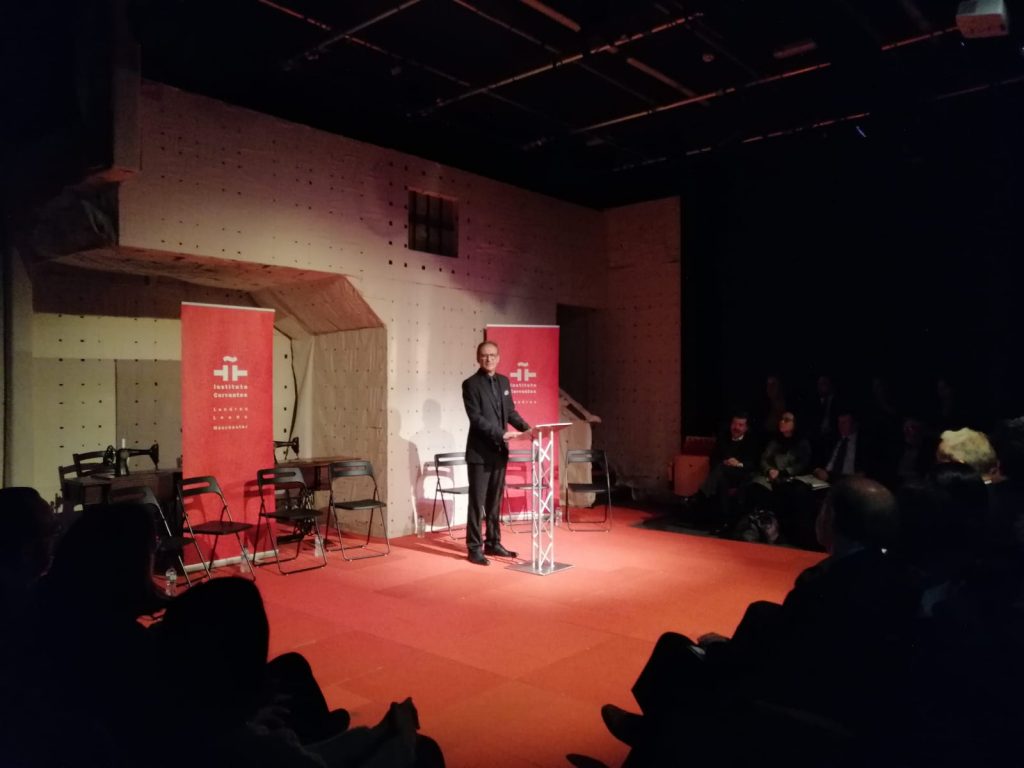
Poetry reading at the Cervantes Theatre
The event concluded with a recital of Spanish love poetry in tribute to the Spanish Trevor Dadson in charge of the artistic director of the Cervantes Theatre, Jorge de Juan. This is the first Spanish-speaking theatre in the history of British theatre and its associate director called for the United Kingdom and Spain to consolidate «the strong ties that have always existed between our two communities.»
“At the Cervantes Theatre, now more than ever, we have to continue spreading our culture and our language, which continues to grow and is studied by British students more than ever. We want to be the gateway for many young Spaniards and Latin Americans who want to continue dreaming of a better future in a country they admire for their history and their people,” said De Juan.
Figuras de la cultura hispano-británica analizan la relación cultural bilateral tras el Brexit

Destacadas figuras de la cultura hispano británica han participado en la mesa redonda Futuro: English & Hispanic Culture After Brexit, en la que destacaron la unión de ambos países para afrontar los retos y aprovechar las oportunidades tras el Brexit, así como la relevancia del español como lengua relevante para la vida cotidiana y su increíble crecimiento en las escuelas británicas. El evento tuvo lugar en el Cervantes Theatre bajo los auspicios del Instituto Cervantes de Londres y con apoyo de la Embajada de España.
La introducción fue a cargo del Embajador de España en Reino Unido, Carlos Bastarreche. A continuación, tomó la palabra el director del Instituto Cervantes de Londres, Luis García Montero, quien realizó un Homenaje al hispanismo británico, elogiando la labor de grandes historiadores y académicos como Sir John Elliott, Sir Paul Preston o el recientemente fallecido Trevor Dadson.
La mesa redonda estuvo moderada por el corresponsal de El País en Reino Unido, Rafa de Miguel, y contó con los siguientes ponentes: la directora del English National Ballet (ENB), Tamara Rojo; el Embajador del Ecuador en el Reino Unido y novelista, Jaime Marchán; el ex embajador de Reino Unido en España, Simon Manley; la directora del Institute for Modern Languages Research (IMLR), Catherine Davies; la presidenta de la Sociedad de Científicos Españoles en el Reino Unido (CERU), Rocio Gaudioso; y el investigador del Real Instituto Elcano, Ignacio Molina.

El valor de la lengua como derecho humano
El Embajador del Ecuador en el Reino Unido y novelista, Jaime Marchán, apuntó a que el Brexit es “la concreción democrática de la decisión de un país miembro de salir de la UE”. Sin embargo, precisó que, como todo cambio, puede “ser visto también como una oportunidad” y cree que, en adelante, veremos un país europeo con mayor autonomía para desempeñar un papel global importante en todos los ámbitos, incluido el cultural.
Para Marchán, el Brexit “nos invita a reflexionar en el poder universal de la lengua inglesa más allá de toda frontera” y citó una frase memorable de George Steiner, figura fundamental del pensamiento crítico del siglo XX, que en su opinión, resume a la perfección el sentido pluricultural de la lengua y de la literatura: “Denme una mesa de trabajo y ya tengo una patria”.
De hecho, su apuesta como Embajador es “por un mejor conocimiento recíproco de ambas lenguas: el español y el inglés”, destacando como el Instituto Cervantes y el British Council son una base cultural importante para incrementar un mejor y mayor conocimiento, no solo de las lenguas, sino de las culturas iberoamericana e inglesa. Pero la lengua no es solo palabras, y así, quiso reivindicar “el valor de la lengua como derecho un derecho humano”.

“El increíble crecimiento” del castellano en las escuelas británicas
El ex embajador de Reino Unido en España, Simon Manley, espera que el futuro de la relación cultural entre Reino Unido y el mundo hispano después del Brexit sea “riquísima”, ensalzando los vínculos y oportunidades, sobre todo “gracias a los esfuerzos de tantos españoles tan talentosos en nuestro país”.
Para Manley, el reto actual es “la incertidumbre y las noticias falsas”. Mientras que las oportunidades “son más importantes”, con dos países orgullos de sus grandes tradiciones, pero con vistas internacionales y visiones innovadoras. Además, destacó “el increíble crecimiento” del castellano en las escuelas británicas, y como, la cultura hispana avanza en dimensiones varias, con series de Netflix como La casa de papel hasta el flamenco, el cine, o la gastronomía.
Español, una lengua relevante para la vida cotidiana
La directora del Institute for Modern Languages Research (IMLR), Catherine Davies, destacó como en los últimos diez años, el número de estudiantes que se matriculan en lenguas modernas ha disminuido, especialmente en alemán y francés, pero no en el caso del español y el portugués, que han crecido en importancia, estatus e impacto en el sector de la educación superior.
En el caso del estudio del español en los colegios, Davies cree que el interés por el español ha crecido enormemente en los últimos 20 años: “El español se considera relevante para la vida cotidiana, principalmente porque la mayoría de los británicos y sus hijos han visitado España y han pasado sus vacaciones allí. Muchos expatriados británicos viven en España, especialmente los abuelos. El español es un idioma fácil de adquirir en un nivel básico, por lo que la comunicación se puede establecer rápidamente. Los jóvenes están motivados, sienten que están progresando y pueden probar sus habilidades lingüísticas en vacaciones”.
Davies apunta que “será más difícil reclutar profesores y profesores universitarios de España” y no ocultó su preocupación por si “el tráfico constante de bienes y personas entre los dos países puede verse seriamente comprometido”, sin embargo, apuntó a que el interés británico en España es anterior a la entrada de Reino Unido en la UE.

Reino Unido y la Unión Europea se necesitan
La presidenta de la Sociedad de Científicos Españoles en el Reino Unido (CERU), Rocio Gaudioso, destacó que la comunidad científica se encuentra en una situación con respecto al Brexit que es, “a la vez, una oportunidad y un reto: la investigación no puede realizarse en aislamiento, Reino Unido y la Unión Europea necesitan el uno de la otra para mantener su competitividad y poder afrontar los retos sociales y tecnológicos que vienen”.
Gaudioso puntualizó que que las relaciones hispano-británicas en materia de investigación son “maduras y están bien fundadas en respeto y admiración entre ambos países”, con lo que situación puede ayudar a disminuir los efectos negativos del Brexit, pero recalcó que “los daños ya se están haciendo visibles y tan solo con una fuerte actividad de diplomacia y colaboración científica, en la que prevalgan nuestros objetivos comunes, podremos hacer frente a los retos que nos vienen”.
Gaudioso tiene claro que “la investigación siempre ha sido, y siempre será, una misión global. Los retos a los que nos enfrentamos no podrán ser solucionados por países en aislamiento y esto es algo que tanto los investigadores como los gobiernos saben. Las promesas y buenos deseos están ahí, necesitamos que la voluntad política en ambos lados del canal refleje este deseo y hagan posible una relación lo más estrecha posible para que la comunidad investigadora pueda seguir trabajando junta”.
Dos vertientes de la relación futura entre el Reino Unido y España
Durante la mesa redonda, el investigador del Real Instituto Elcano, Ignacio Molina, aludió a dos vertientes de la relación futura entre el Reino Unido y España. La primera se centra en la dimensión más europea, tratando de responder a la pregunta de por qué ha sido siempre tan distinta la percepción que han tenido los británicos del resto de los ciudadanos de la UE sobre lo que es y debe ser el proceso de integración.
“Entre los 27 (y singularmente en España) se ha tendido mayoritariamente a ver a Europa como la solución a los problemas nacionales en términos de paz. seguridad, prosperidad, bienestar, normalización, democracia. En cambio, ni las elites ni la opinión pública del Reino Unido ha tenido conciencia profunda de que su ser nacional era «problemático» o estaba «amenazado» y, por tanto, no han visto a la UE como esa gran empresa de futuro que les era propia, sino más bien como un cálculo pragmático o un simple mal menor”, recalcó Molina.
En la segunda vertiente de su participación en la mesa, trató la relación más específicamente bilateral entre Reino Unido y España. En este caso, le interesó plantear, con cierta provocación optimista, “que no hay en la Historia de las relaciones internacionales una enemistad más larga entre dos Estados (en parte porque son dos de los Estados más antiguos del mundo) y, a la vez, tampoco hay otro caso de dos países que no siendo vecinos ni compartiendo idioma tengan ahora mismo una relación tan intensa y tanto potencial de armonía. Armonía que por el momento no se ha expresado tanto en lo político (en parte por la recién comentada muy distinta manera en que ambos países veían la integración europea o por el viejo contencioso de Gibraltar) sino mucho más, y esto es lo interesante teniendo en cuenta el enfoque del resto de ponentes en la mesa, en los aspectos culturales, personales y empresariales”.
Para Molina, es evidente que “el Brexit marca un antes y un después en la forma de relacionarse entre Reino Unido y la UE. Es inevitable que la relación sufra a todos los niveles. Y estamos a la espera de ver cómo se plasma ese acuerdo de futuro a partir de 2021. Ahora mismo el principal reto es evitar un Brexit demasiado duro, aunque no se puede ser del todo optimista. Sin embargo, no creo que haya que ser tan pesimista en el vínculo concreto hispano-británico”.

Lectura de poesía en el Cervantes Theatre
El acto concluyó con un recital de poesía amorosa española en homenaje al hispanista Trevor Dadson a cargo del director artístico del Cervantes Theatre, Jorge de Juan. Se trata del primer teatro de habla hispana en la historia del teatro británico y su director asociado llamó a que Reino Unido y España consoliden “los fuertes lazos que siempre han existido entre nuestras dos comunidades”.
“En el Cervantes Theatre, ahora más que nunca, tenemos que seguir difundiendo nuestra cultura, nuestro idioma, que no deja de crecer y que es estudiado por los estudiantes británicos más que nunca. Queremos ser la puerta de entrada para muchos jóvenes españoles y latinoamericanos que quieren seguir soñando con un futuro mejor en un país al que admiran por su historia y por sus gentes”, destacó De Juan.
Director of Instituto Cervantes, Luis García Montero, visits London and Oxford
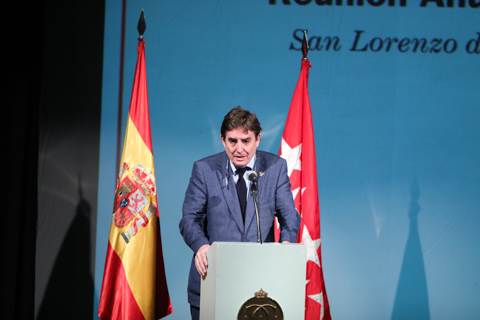
The director of Instituto Cervantes, Luis García Montero, visits London and Oxford from Thursday 27th to Saturday 29th February, with an agenda that includes a tribute to British Hispanist Sir Paul Preston, the participation in the round table: Futuro: English & Hispanic Culture After Brexit and a meeting with the British Council, as well as his attendance to the 50th Anniversary celebrations of the Spanish Sub-Faculty of the University of Oxford and the signing of a memorandum of understanding with Magdalen College.
García Montero’s visit will begin on Thursday 27th with a breakfast with teachers of Spanish for Foreigners (ELE) in the library of Instituto Cervantes in London. At 11:00am, he will hold a meeting with the CEO of the British Council, Sir Ciarán Devane.
The director of Instituto Cervantes will have lunch with creators, academics and Latin American cultural guests. In the afternoon, García Montero will visit the offices of Instituto Cervantes in London, where he will have a tour of the facilities and hold meetings with the staff, as well as with the area directors with whom he will inform about the agreed agreements.
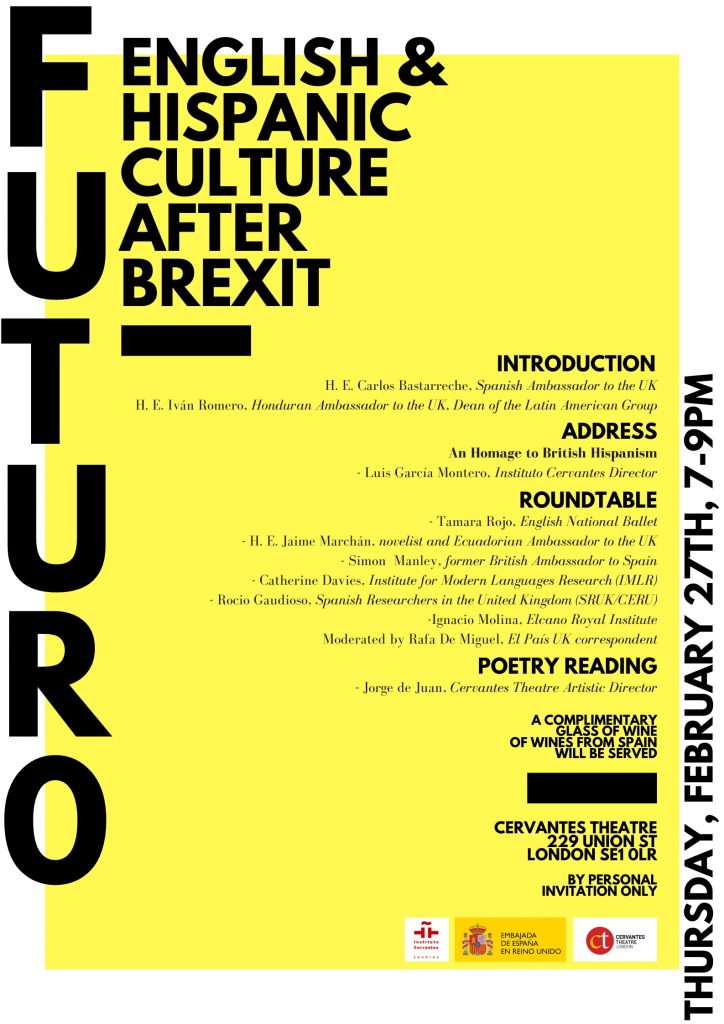
Roundtable: «Future: English & Hispanic Culture After Brexit»
In the evening, García Montero will attend the round table discussion: Futuro: English & Hispanic Culture After Brexit» the Cervantes Theatre. The Ambassador of Spain to the United Kingdom, Carlos Bastarreche, will introduce the evening, attendees of which include the Ambassador of Honduras to the United Kingdom and the Dean of the Latin American Ambassador Group, Iván Romero.
Next, the director of Instituto Cervantes will take the floor and he will deliver a spoken tribute to British Hispanism. The round table will be moderated by the correspondent of newspaper El País in the United Kingdom, Rafa de Miguel, and will have the following speakers: the director of the English National Ballet (ENB), Tamara Rojo; the Ambassador of Ecuador in the United Kingdom and novelist, Jaime Marchán; former United Kingdom Ambassador to Spain, Simon Manley; the director of the Institute for Modern Languages Research (IMLR), Catherine Davies; the president of the Society of Spanish Scientists in the United Kingdom (CERU), Rocio Gaudioso; and the researcher of the Elcano Royal Institute, Ignacio Molina.
The event will end with a recital of love poetry in Spanish in an homage to the recently deceased Hispanist Trevor Dadson, by the associate director of Cervantes Theatre, Jorge de Juan.
At the end of the round table, García Montero will attend a dinner with Spanish and British businessmen in the United Kingdom, including the president of the Spanish Chamber of Commerce in the United Kingdom, Eduardo Barrachina, and Spanish personalities working in the City.
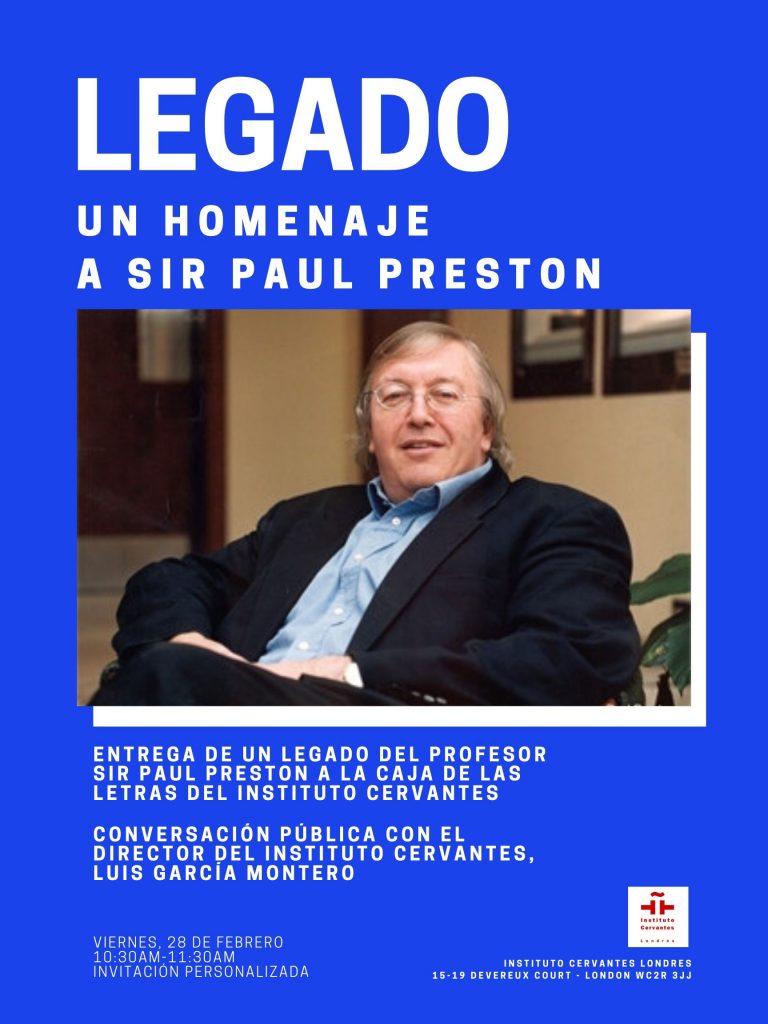
Paul Preston’s legacy
British Hispanst Sir Paul Preston will speak with the press on Friday February 28th, in the library of Instituto Cervantes in London. At 10:30a.m. the tribute will begin, in which the outstanding historian will deliver his legacy to the Caja de las Letras of Instituto Cervantes. Although this is the second donation to the Caja de las Letras from a Hispanist, it is the first donation to be given outside of the building in Madrid itself.
Sir Paul Preston will sign two copies of the assignment document and the director of Instituto Cervantes will keep the bequeathed item in a red briefcase and give Sir Paul Preston the symbolic key and the copy of the assignment document for five years.
Following the ceremony of the Caja de las Letras, they will hold a public conversation about Preston’s outstanding career as a historian.
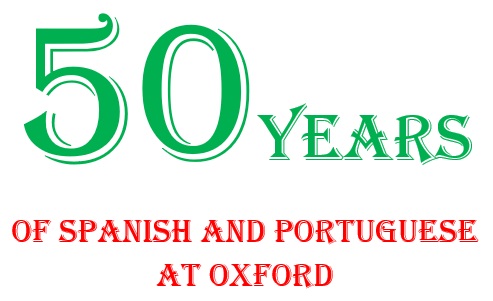
García Montero’s visit to Oxford
On Friday February 28th, García Montero will say a few words and participate in a poetry recital in the framework of the 50th anniversary of the Spanish and Portuguese Sub-Faculty of the University of Oxford.
In addition, García Montero will hold a meeting with the professor and promoter of the Madariaga Series, Juan Carlos Conde, on Saturday 29th at 9:00am. Then, both will visit Magdalen College, where the signing ceremony of the collaboration memorandum between Instituto Cervantes and Magdalen College will take place, with the presence of its president, Sir David Clary.
Visita del director del Instituto Cervantes, Luis García Montero, a Londres y Oxford

El director del Instituto Cervantes, Luis García Montero, visita Londres y Oxford del jueves 27 al sábado 29 de febrero, con una agenda que incluye un homenaje al hispanista británico Sir Paul Preston, la participación en la mesa redonda: «Futuro: British & Hispanic Culture After Brexit» y una reunión con el British Council, así como la asistencia a las celebraciones del 50 Aniversario de la Subfacultad de Español de la Universidad de Oxford y la firma de un memorando de entendimiento con Magdalen College.
La visita de García Montero arrancará el jueves 27 con un desayuno con profesores Español para Extranjeros (ELE) en la biblioteca del Instituto Cervantes de Londres. A las 11:00 horas mantendrá una reunión con el director ejecutivo del British Council, Sir Ciarán Devane.
El director del Instituto Cervantes almorzará con creadores, académicos y actores culturales iberoamericanos. Por la tarde, García Montero visitará las dependencias del Instituto Cervantes de Londres, donde conocerá las instalaciones del centro y mantendrá encuentros con los trabajadores, así como con los directores de área, a los que informará de los acuerdos acordados.

Mesa redonda: «Futuro: English & Hispanic Culture After Brexit»
Esa tarde, asistirá a la mesa redonda: «Futuro: English & Hispanic Culture After Brexit», que tendrá lugar en el Cervantes Theatre. La introducción será a cargo del Embajador de España en Reino Unido, Carlos Bastarreche, y del Embajador de Honduras en Reino Unido y Decano del Grupo de Embajador Latinoamericanos, Iván Romero.
A continuación, tomará la palabra el director del Instituto Cervantes de Londres, quien pronunciará un Homenaje al hispanismo británico. La mesa redonda estará moderada por el corresponsal de El País en Reino Unido, Rafa de Miguel, y contará con los siguientes ponentes: la directora del English National Ballet (ENB), Tamara Rojo; el Embajador del Ecuador en el Reino Unido y novelista, Jaime Marchán; el ex embajador de Reino Unido en España, Simon Manley; la directora del Institute for Modern Languages Research (IMLR), Catherine Davies; la presidenta de la Sociedad de Científicos Españoles en el Reino Unido (CERU), Rocio Gaudioso; y el investigador del Real Instituto Elcano, Ignacio Molina.
El acto concluirá con un recital de poesía amorosa española en homenaje al hispanista Trevor Dadson, recientemente fallecido, a cargo del director asociado del Cervantes Theatre, Jorge de Juan. Al finalizar, García Montero asistirá a una cena con empresarios españoles y británicos en Reino Unido, en la que también estará el presidente de la Cámara de Comercio en Reino Unido, Eduardo Barrachina, y personalidades españolas de la City.

Legado de Paul Preston
El hispanista británico Sir Paul Preston atenderá a la prensa el viernes 28 de febrero, en la biblioteca del Instituto Cervantes de Londres. A las 10:30 horas dará comienzo el homenaje, en el que el destacado historiador hará entrega de su legado a la Caja de las Letras del Instituto Cervantes, tratándose del primero que se hace en la distancia y el segundo que realiza un hispanista.
Sir Paul Preston firmará dos copias del documento de cesión y el director del Instituto Cervantes guardará el objeto legado en un maletín rojo y entregará a Sir Paul Preston la llave simbólica y la copia del documento de cesión por cinco años. A continuación, mantendrán una conversación pública sobre su destacado trayectoria como historiador.

Visita de García Montero a Oxford
El viernes 28 de febrero, García Montero dirá unas palabras y participará en un recital de poesía en el marco del 50 aniversario de la Subfacultad de Español y Portugués de la Universidad de Oxford.
Además, mantendrá una reunión con el catedrático e impulsor del Ciclo Madariaga, Juan Carlos Conde, el sábado 29. Acto seguido, ambos visitarán Magdalen College, donde tendrá lugar la ceremonia de firma del memorando de entendimiento de colaboración entre el Instituto Cervantes y Magdalen College, en presencia de su presidente, Sir David Clary.
An exhibition honouring Chaves Nogales opens in Newcastle
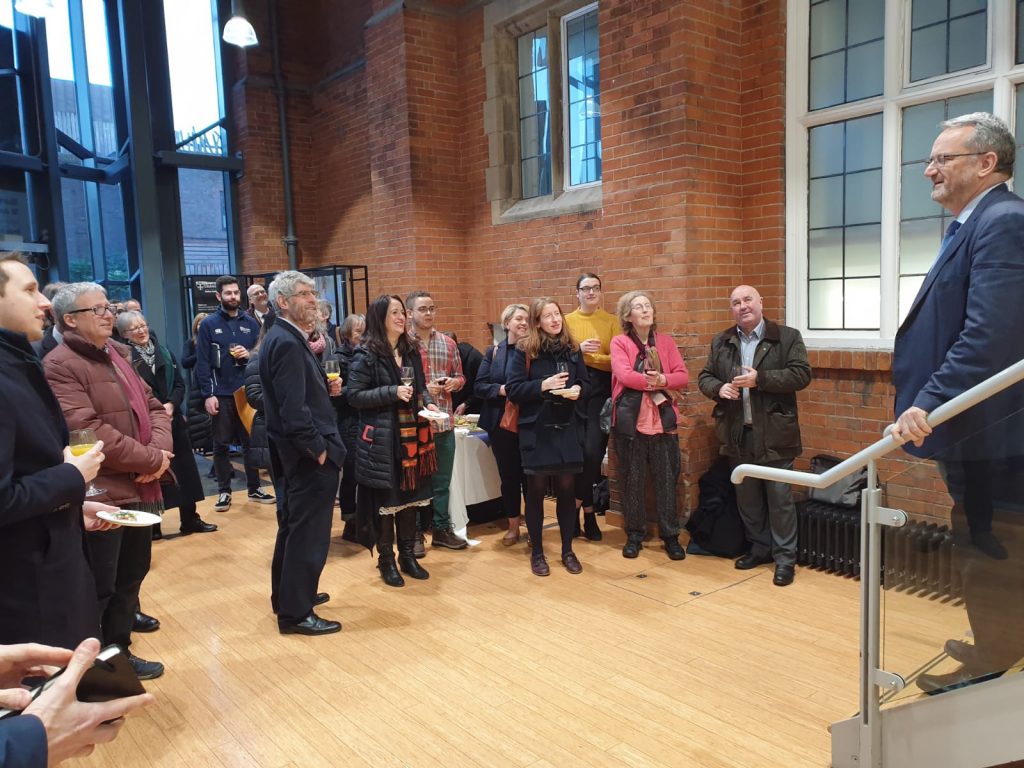
The exhibition ‘Europe at War: Chaves Nogales – Spanish journalist and exile 1917 – 1944’ is on display at Newcastle University’s Long Gallery, until the February 21st . It has been organised by staff at Newcastle University with colleagues from the University of Seville, and with the support of Instituto Cervantes Londres.
The exhibition was officially opened by one of Chaves Nogales’s grandchildren, Antony Jones, and Juan Belmonte’s great-granddaughter, Tatiana Beca Osborne. It was also attended by Director of Instituto Cervantes in London, Ignacio Peyró, and representatives from the University of Seville, such as Director of Culture and Heritage at the University of Seville, Luis Rafael Méndez Rodríguez.
The exhibition includes an original copy of one of Chaves Nogales’ articles for the North Mail and other examples of his writing. As well as paying homage to Chaves Nogales and the memory of other exiles in Britain, it also remembers the significant number of men and women from the North East who travelled to Spain in the 1930s to fight against General Franco’s forces.
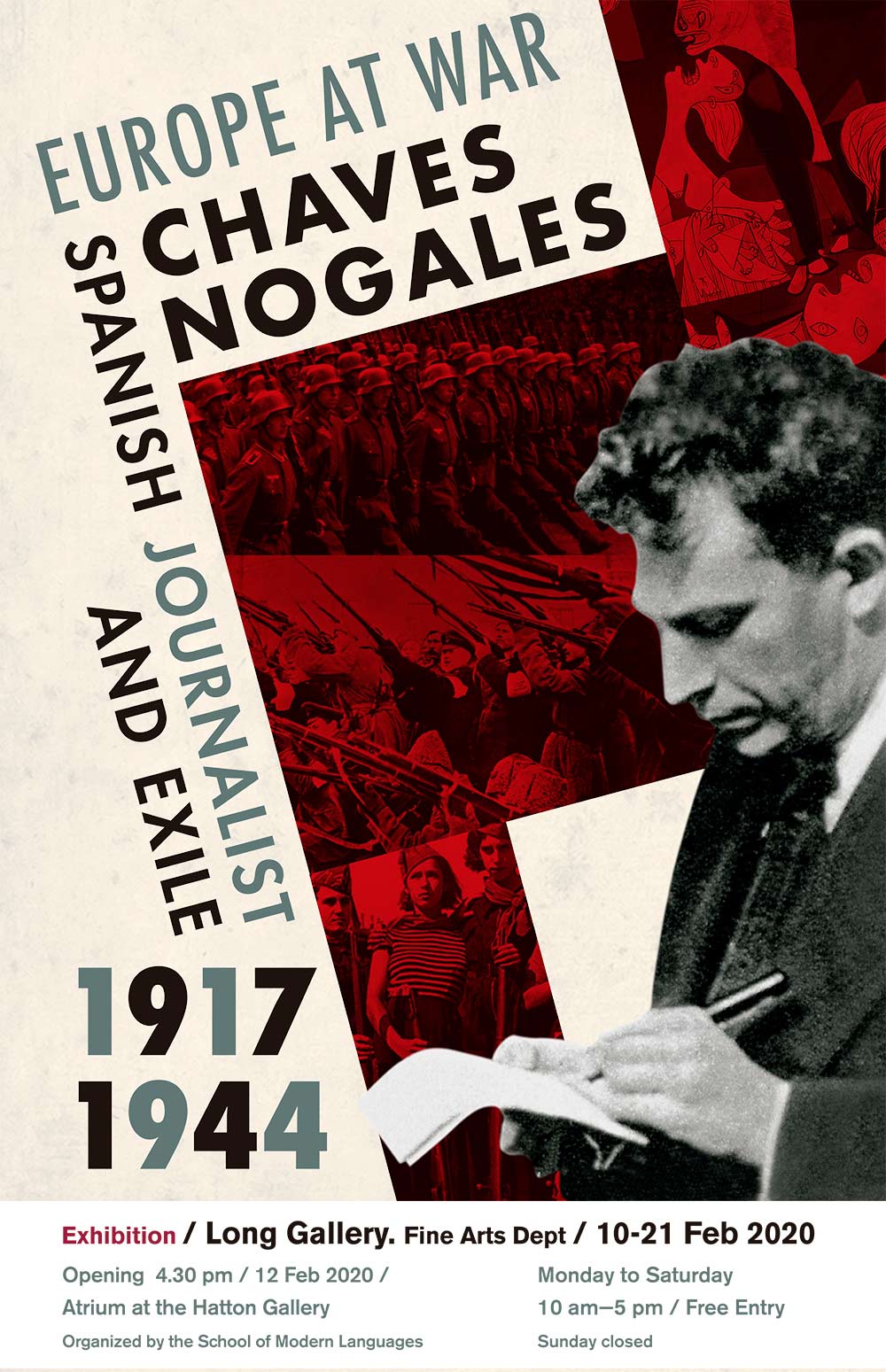
Chaves Nogales, a renowned Spanish journalist
Manuel Chaves Nogales was a Spanish journalist renowned for refusing to take an extreme ideological position and who warned against the growth of fascism across Europe. He travelled extensively through Europe and was one of the first foreign correspondents to witness and report on events taking place in Russia in the immediate aftermath of the 1917 revolution, pioneering a new style of journalism that was more similar to feature-based, in-depth journalism.
In 1930, Chaves Nogales became editor of the influential and ideologically moderate newspaper, Ahora. Although he nominally supported the Republic against the military uprising of General Franco in 1936, his overriding commitment was to report the truth of what was unfolding across Europe and became part of the so-called ‘Third Spain’ affiliated to neither far right nor far left. As a result, he was regarded as one of the most incisive and unbiased journalists working in Europe.
Last November, Instituto Cervantes in London paid tribute to the memory of all Spanish exiles at the grave of Chaves Nogales. The tribute took place in the North Sheen Cemetery in London and was chaired by the ambassador of Spain to the United Kingdom, Carlos Bastarreche.
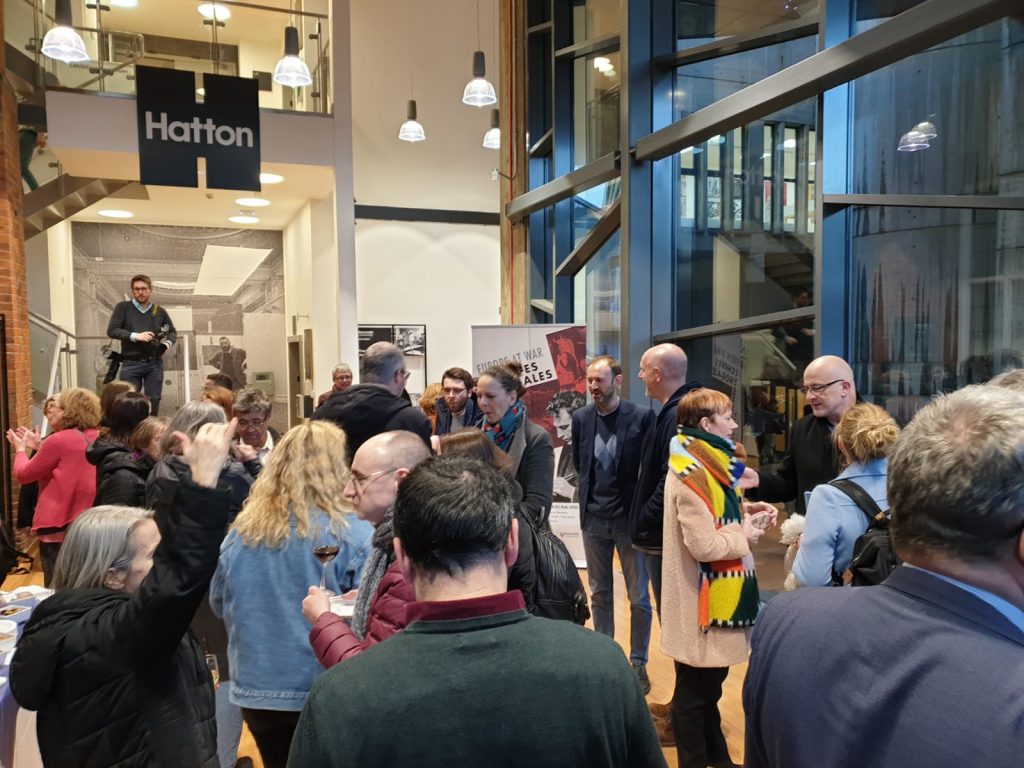
Inaugurada una exposición en honor a Chaves Nogales en Newcastle

La exposición ‘Europa en guerra: Chaves Nogales – periodista español y exilio 1917 – 1944″ se exhibe’ fue inaugurada en la galería Long de la Universidad de Newcastle y estará abierta al público hasta el próximo 21 de febrero. Ha sido organizada por el personal de la Universidad de Newcastle, junto con el de la Universidad de Sevilla y con el apoyo del Instituto Cervantes de Londres.
Inaugurada por uno de los nietos de Chaves Nogales, Antony Jones, y la bisnieta de Juan Belmonte, Tatiana Beca Osborne, a ella también asistieron el director del Instituto Cervantes de Londres, Ignacio Peyró, y representantes de la Universidad de Sevilla, como el Director de Cultura y Patrimonio de la Universidad de Sevilla, Luis Rafael Méndez Rodríguez.
La exposición incluye una copia original de uno de los artículos de Chaves Nogales para North Mail y otros ejemplos de sus escritos. Además de rendir homenaje a Chaves Nogales y el recuerdo de otros exiliados en Reino Unido, también recuerda a la cantidad de hombres y mujeres del noreste que viajaron a España en la década de 1930 para luchar contra Franco.

Chaves Nogales, un reconocido periodista español.
Manuel Chaves Nogales fue un periodista español reconocido por negarse a tomar una posición ideológica extrema y que advirtió contra el crecimiento del fascismo en toda Europa. Viajó extensamente por Europa y fue uno de los primeros corresponsales extranjeros en presenciar e informar sobre los eventos que tuvieron lugar en Rusia inmediatamente después de la revolución de 1917, siendo pionero en un nuevo estilo de periodismo que era más similar al periodismo en profundidad.
En 1930, Chaves Nogales se convirtió en director del influyente e ideológicamente moderado periódico Ahora. Aunque apoyó a la República contra el levantamiento militar de Franco en 1936, su principal compromiso fue informar de lo que se estaba ocurriendo en Europa y se convirtió en parte de la llamada ‘Tercera España’, sin afiliarse a la extrema derecha ni la extrema izquierda . Como resultado, fue considerado como uno de los periodistas más incisivos e imparciales que trabajaron en Europa.

El pasado mes de noviembre, el Instituto Cervantes de Londres rindió homenaje a la memoria de todos los exiliados españoles en la tumba de Chaves Nogales. Tuvo lugar en el Cementerio North Sheen de Londres y fue presidido por el embajador de España en el Reino Unido, Carlos Bastarreche.
UK celebrates the life and work of Osma, the first Spaniard to graduate from Oxford
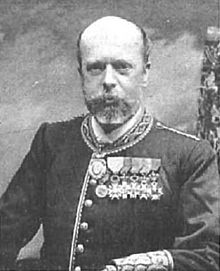
The University of Oxford paid tribute today to Guillermo J. de Osma, the first Spaniard to study at Oxford. This possibility was thanks to the University Examination Law of 1871, which opened access to the universities of Oxford, Cambridge and Durham to non Anglicans.
The «Osma Day» took place on February 7th 2020, on the centenary of the constitution for the first Spanish scholarship at the University of Oxford. It celebrates the graduation of Guillermo Joaquín de Osma y Scull (Havana, Cuba, 1853 – La Negresse, France, 1922), who went on to become a diplomat, deputy, senator, finance minister, president of the State Council after being the first Spaniard to study at Oxford.
The professor and researcher at the University of Oxford, Marina Pérez de Arcos, emphasised: «It is the first symposium to tribute a Spaniard held here with the active support of the highest university authorities in Oxford.»
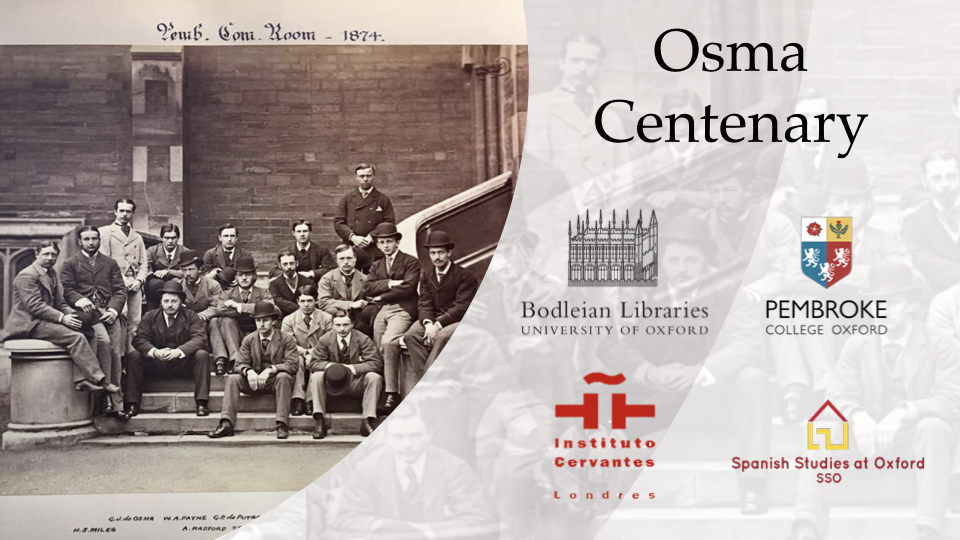
Osma Scholarship and Symposium
The list of winners of the Osma scholarship in Oxford is a long and very established list. Among them are professors Alfonso XIII of Oxford, Sir Peter Russell; and prominent academics such as Ronald Hilton, Henry Kamen, Jeremy Lawrence, Anthony Pagden.
Within the centenary celebrations, a one-day symposium about Osma was also held at the Bodleian Library, at University of Oxford with the support of Instituto Cervantes in London. Osma scholars from all generations and countries, including specialists from Spain and the United Kingdom as well as Osma’s descendants congregated to pay tribute to the diplomat, politician, historian and art collector.
The director of Instituto Cervantes in London, Ignacio Peyró, noted: “Spain has a special bond with Oxford and Instituto Cervantes. Through various initiatives, including support for this laudable Osma centenary, we aim to strengthen the links to promote knowledge of the shared past and project it into the future ”.

Osma in Oxford
Osma arrived in Oxford from his native Havana, passing through Paris where he studied at the Sorbonne. His journey culminated in 1920 when British Parliament approved access to English historical universities to non-Anglican students.
His university education was spent at Pembroke College, Oxford, and his alma mater left him with his distinctive and indelible stamp.
Commissioning of the Valencia Institute of Don Juan
Once in Spain, Osma left aside his services to the nation and his political and business activities. Having no offspring and committed with research and Spanish culture and art with his wife, Mrs. Adelaida Crooke y Guzmán, XXIV Countess of Valencia de Don Juan, they founded the Valencia Institute of Don Juan, in 1916.
The patronage of the Institute was formed with personalities as relevant as Don Jacobo, Duke of Alba; Archer M. Huntington, founder of the Hispanic Society of America; Hercules Reed, curator of the British Museum and president of the London Antique Association; Antonio Maura, prime minister and director of the Royal Spanish Academy; and the Spanish Arabist, Miguel Asín Palacios.
The bylaws of the foundation of the Institute that Osma developed allowed the building where their funds are kept to be considered British soil during the Spanish civil war. This way, the Golden Fleece Codex, recently acquired by National Heritage, plus vessels of the Alhambra, a third of the government documents of Felipe II, tapestries and Hispanic-Mudejar fabrics, among many other very valuable works of historical and artistic heritage Spanish that Osma and his wife were treasuring and incorporating into the Institute.
Osma’s legacy, who died ninety-eight years ago today, remains active in his eagerness to break stereotypes and promote ties between Oxford and Spain.
Reino Unido celebra la vida y obra de Osma, el primer español en graduarse de Oxford

La Universidad de Oxford rinde hoy viernes un homenaje a Guillermo J. de Osma, el primer español en estudiar en Oxford después de la Ley de Examen de Universidades de 1871, que abrió el acceso a las universidades de Oxford, Cambridge y Durham a los no anglicanos.
El “Osma Day” tiene lugar el 7 de febrero con motivo del centenario de la constitución de la primera beca española en la Universidad de Oxford, establecida en 1920 por Guillermo Joaquín de Osma y Scull (La Habana, Cuba, 1853 – La Negresse, Francia, 1922), diplomático, diputado, senador, ministro de Hacienda, presidente del Consejo de Estado y primer español en estudiar en Oxford.
La profesora e investigadora de la Universidad de Oxford, Marina Pérez de Arcos, destaca: “Es el primer simposio homenaje a un español celebrado aquí con el respaldo activo de las más altas autoridades universitarias de Oxford”.

Beca Osma y simposio
La lista de premiados de la beca Osma en Oxford es larga y muy señalada, entre ellos se encuentran catedráticos Alfonso XIII de Oxford, Sir Peter Russell; y otros académicos muy destacados como Ronald Hilton, Henry Kamen, Jeremy Lawrence, Anthony Pagden.
En el marco de esa jornada también se celebra un simposio de un día en la Biblioteca Bodleian, centro neurálgico de la Universidad de Oxford, sobre Osma, contando con el apoyo del Instituto Cervantes de Londres. Además, se convoca a becados Osma de todas las generaciones y países, especialistas de España y el Reino Unido, así como a los descendientes del diplomático, político, historiador y coleccionista de arte.
El director del Instituto Cervantes de Londres, Ignacio Peyró, señala: “España tiene un vínculo especial con Oxford y el Instituto Cervantes, a través de diversas iniciativas, entre las que se incluye el apoyo a esta tan laudable del centenario de Osma, quiere ayudar a fortalecer ese vínculo para promover el conocimiento del pasado compartido y proyectarlo hacia el futuro”.

Osma en Oxford
Osma llegó a Oxford desde su Habana natal, pasando por París donde realizó sus estudios de bachillerato en la Sorbona, los cuales culminó el año en el que el Parlamento británico aprobó abrir las puertas de las universidades históricas inglesas a los estudiantes no anglicanos.
Su formación universitaria la realizó adscrito a Pembroke College, Oxford, y su alma mater le dejó impreso su sello distintivo e indeleble como pone de manifiesto su discurrir vital.
Puesta en marcha del Instituto Valencia de Don Juan
Una vez en España y dejando aparte sus servicios a la nación y sus actividades políticas y empresariales, y al no tener descendencia y estar comprometido junto a su esposa, doña Adelaida Crooke y Guzmán, XXIV Condesa de Valencia de Don Juan, con la investigación y la cultura y el arte españoles, fundaron el Instituto Valencia de Don Juan, en 1916.
Al Instituto, de carácter investigador, Osma le procuró unos estatutos minuciosamente pensados y compuso el patronato fundacional con personalidades tan relevantes como don Jacobo, duque de Alba; Archer M. Huntington, fundador de la Hispanic Society of America; Hercules Reed, conservador del British Museum y presidente de la Asociación de Anticuarios de Londres; Antonio Maura, primer ministro y director de la Real Academia Española; y el arabista español, Miguel Asín Palacios.
Los estatutos de la fundación del Instituto que Osma elaboró permitieron que el edificio donde se guardan sus fondos se considerara suelo británico durante la guerra civil española. Así pudieron salvarse el Códice del Toisón de Oro, recientemente adquirido por Patrimonio Nacional, vasijas de la Alhambra, un tercio de los documentos de gobierno de Felipe II, tapices y tejidos hispano-mudéjares, entre otras muchas y valiosísimas obras del patrimonio histórico y artístico español que Osma y su esposa fueron atesorando e incorporando al Instituto.
El legado de Osma, fallecido noventa y ocho años tal día como hoy, continúa activo en su afán de romper estereotipos y promover lazos entre Oxford y España.


